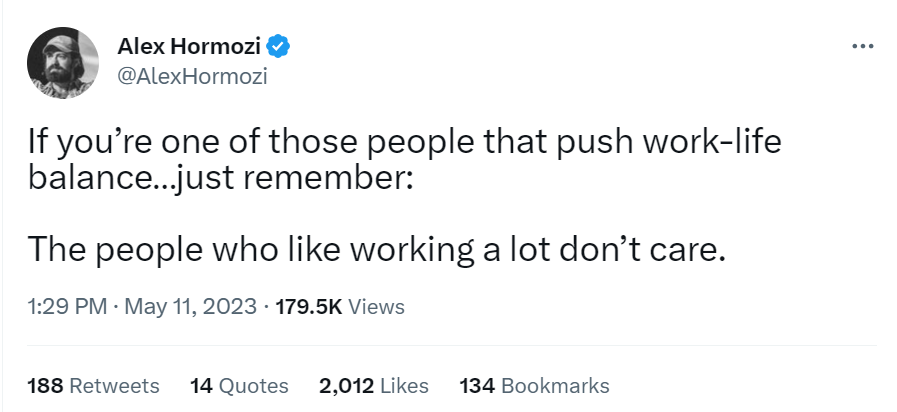
Personally, I think the phrase, “Work-Life balance” is problematic.
I once heard Joanna Le Fleur say that she didn’t want a work-life balance. She wanted to be passionate about whatever she was doing, to go all in.
I can relate to that.
I don’t want a balance. I want a life I love- and the hours I spend working are a huge part of that.
However, I came across this tweet recently (I know in the Twitterverse this is probably old news- it’s almost a month old lol)
… but I feel like it sums up a lot of the false dichotomies out there about work.

The false argument presented in this tweet is this:
You can either be a hard worker, or you can have a work-life balance. But you can’t have both.
I think it’s much healthier to think of it a third way:
Your work should serve the lifestyle you want.
If your dream is to be the kind of person who hustles, then by all means your work should serve that. You should clock in early and stay late. You should start the side hustles you dream about at night. You should take up bodybuilding, cliff jumping, or start a new hobby in your spare time & become an expert in it so that you can turn it into a business in 5+ years.
But if you dream of having time to be with your kids, your spouse, or really anyone you love, then your work should serve that.
If you’d rather be the kind of person who says yes to adventure (random trip to Bermuda, anyone?) when it presents itself, then you should choose work that makes that possible for you.
The point is, there are many ways to experience this world, and whichever one you like is the one your work should serve.
Choosing an alternative other than constant hustle doesn’t necessarily mean you’re lazy.
Despite what some people will tell you, there’s nothing particularly virtuous about workaholism.
Workaholism does not equal work ethic.
They’re not the same thing. We get confused because we think they are. And, if what I’ve read from people later in their careers is any indication (Carey Nieuwhof and Gordon MacDonald, for instance), this is how you hit a wall, burn out, or lose your passion for something entirely.
It’s good to have a work ethic. You could even argue that it’s virtuous to do things to the best of your ability in a short time frame, consistently meet deadlines, and reach your goals.
But you can have a work ethic without being the person who pulls all-nighters or works weekends without pay.
If you know what kind of life you want to lead, then you can have a work ethic and a life outside of work.
You can do even better, in fact: you can use your work to fuel that life.
And that’s the real key to having a successful life.
Sure, people on Twitter and LinkedIn and Youtube and whatever other social media platforms you frequent may disagree.
But they aren’t living your life, are they?

Woah, so many good points that I hadn’t considered before! “Your work should serve the lifestyle you want.”
😀 Thanks! Appreciate you!
This is a really good thought that has never occurred to me. I think that maybe this idea is what people originally meant with the phrase “work-life balance” but I’m not sure. It’s so true though, that no one else is living your life and only you know what is needed for your family, your values, and your dreams.
Thanks Sarah!! 🙂